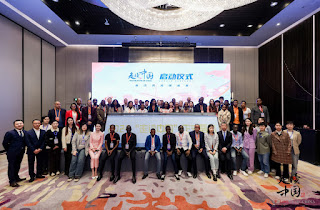Media Exchange Programme Cements China-Africa Relations
By Linda Mupemo, Beijing
 |
| 2024 CIPCC Fellows |
As the 2030 agenda for sustainable development deadline draws near, United Nations (UN) member states are intensifying their efforts aimed at achieving the 17 goals.
The People's Republic of China is one of the few countries that have achieved Sustainable Development Goal (SDG) number one which focuses on eliminating extreme poverty.
China Anti- Poverty Research Institute Professor Wang Sangui states that the Chinese Government succeeded in lifting over 800 million people out of poverty by 2020, ten years ahead of the UN schedule.
The Asian country has equally made headways with the provision of clean and affordable energy, promoting industrialisation, innovation and quality education among other goals.
Having realised the vital role international cooperation plays in advancing development and global impact, China is strengthening partnerships with various sectors of the international community with a view to building a shared future of sustainable development for all.
This is in line with SDG number 17 which reads in part, " Enhance the global partnership for sustainable development, complemented by multi-stakeholder partnerships that mobilise and share knowledge, expertise, technology and financial resources to support the achievement of sustainable development goals in developing countries."
For ten years now, the China Public Diplomacy Association (CPDA) has been conducting a media exchange programme through the China International Press Communication Centre (CIPCC) in the country's capital city, Beijing.
The media exchange programme is aimed at improving cooperation between China and countries with participating media organisations.
 |
| CIPCC Director Yu Lei |
CIPCC Director Yu Lei says training for the 2024 cohort which commenced over a month ago has attracted more than 100 Journalists from Latin America, Asia and Africa including Zambia among other parts of the world.
Mr. Lei adds that the media exchange programme will last four months.
"We have 28 participants from the
China- Africa Press Center, 20 from the
China- Asia Pacific Press Center,
22 from the China- Latin America and the Caribbean Press Center. Additionally, we have 13 participants from the
China - Eurasia Press Center, 12 from the
China-Arab States Press Center and eight from the China-Central and Eastern European Countries Press Center," Mr. Lei says.
Mr. Lei explains that the CIPCC has been giving lectures on China's social economic development, diplomacy, culture, science and technology.
" Participants are being trained in latest media trends. Additionally, we have been organising symposiums with relevant departments, enterprises, think tanks and media organisations. The international Journalists also had an opportunity to cover two sessions, the biggest political event in China, " he says.
Apart from covering major local and diplomatic events in the second biggest economy in the world, participants will be attached to China's media organisations towards the end of the training programme.
China's Global Times newspaper General Manager Shan Chengbiao reiterated the need for the media fraternity to package media products that champion international cooperation especially in developing countries.
Mr. Chengbiao notes that the media is a powerful tool that can be used positively to encourage collaboration and sharing of best practices in attaining sustainable development for all.
"The media has a critical role to play in promoting international cooperation among countries. You need to show the benefits of bilateral relations, mutual learning in enhancing economic prosperity," he implored journalists during the launch of the Travelogue of China, an event that showcases the tourism and investment opportunities in Wuxi City of Jiangsu Province.
Malawi's Suzgo Chitete attests to the invaluable knowledge he has gained from the training so far citing that the new information has shone light through all the dark perceptions he previously held of China.
"There is a China I knew before coming here and a China I now know. Following this exchange programme, I will be able to report factually about China based on experience and not borrowed lenses that are bent on vilifying it at every given opportunity in the interest of hegemony," he says.
The portrayal of a positive image of the country in the nation's news media is another factor that has wowed the Nation Publications Limited (NPL) Assistant Bureau Chief.
He observes that media content which focuses on empowering the citizenry to think positively about their country positions the country well in the global eyes adding that that is something African media organisations can learn from.
"This approach is also good for investment purposes as it helps to sell the country to the world. That is not to say we must distort the truth or avoid telling painful truths. We must equally expose wrongdoing otherwise journalism may lose its purpose," he says.
The Chinese level of excellence, hard work and patriotism are unmatched and this is all clear to see for the participants of the CIPCC media exchange programme.
" I am not surprised that their economy ranks as the second largest in the world. Their work ethic is impressive. The leadership and its people are all speaking the same language of promoting quality development," Mr. Chitete adds.
He suggests that future media exchange programmes should consider having Chinese Journalists attached to African media houses to boost information sharing.
Nigeria's Representative Bridget Onochie is of the view that since China has opened itself up for international cooperation with Africa and other regions, the onus is on African leaders to leverage the China-Africa Cooperation to enhance sustainable development on the continent.
The Guardian Newspaper Abuja Bureau Chief is hopeful that exploring the bilateral relations with China would enrich both Africa and China.
Noteworthy is that Chinese authorities have disclosed that Africa is China's biggest trade partner.
"China is beckoning to Africa and the rest of world to partner with it in its developmental agenda. Our leaders should maximise this opportunity and ensure there is a win-win situation," Dr. Onochie says.
The Chinese modernisation practice of embracing technological advancement while at the same time preserving the Chinese culture has captured Seychelles Broadcasting Corporation Reporter Angela Rachel's interest.
"China is creating and adopting new technology but at the same time protecting its culture and heritage. This is highly commendable," Ms. Rachel says.
Ms. Rachel adds that the CIPCC media exchange programme has broadened her knowledge about the China -Africa Cooperation which will refine her reportage on the matter.
The strengthening of the China -Africa Cooperation has raised hope among diplomatic groups such as the International Relations Association of Zambia.
Association President Rosemary Nsepe notes that the efforts China is making regarding international cooperation are a glim of light for future relations.
Ms. Nsepe notes that developing countries especially those in Africa can draw lessons from the Chinese concept of building a community with a shared future for mankind which enabled the country eliminate extreme poverty.
"Developing countries should emulate China and adopt sustainable development principles such as zero tolerance to corruption, investment in education, good governance and improved public finance management," she says.
Notable is that China is developing at a fast rate as experts come up with innovations and technologies aimed at making life easier while at the same time protecting the environment.
From the manufacturing of electric vehicles by Yadea, autonomous cars by Apollo to biodegradable medical products by Naton Technology Group, the country is championing sustainable environmental management in its developmental agenda.
As Zambia celebrates 60 years of bilateral relations with China this year, it is anticipated that the continued mutual cooperation will enhance development in the country.
This feature article was published in Times of Zambia Newspaper on 26th April, 2024.



Comments
Post a Comment